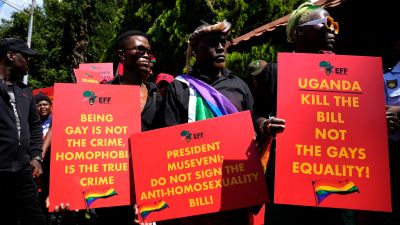UK condemns Uganda's 'appalling' new anti-gay law including death penalty

Downing Street has branded Uganda’s new anti-gay legislation, which includes the death penalty in some cases, as “appalling” and “deeply discriminatory”. The bill was signed into law by Ugandan President Yoweri Museveni on Monday, sparking international condemnation. The new law does not criminalise those who identify as LGBTQ but still prescribes the death penalty for “aggravated homosexuality”.
This is defined as cases of sexual relations involving people infected with HIV as well as with minors and other categories of vulnerable people. A suspect convicted of “attempted aggravated homosexuality” can be jailed for up to 14 years, according to the legislation.
International development minister Andrew Mitchell said: “Democracy depends on the guarantee of equal rights under law and freedom from discrimination for everyone in society. “This legislation undermines the protections and freedoms of all Ugandans enshrined in the Ugandan constitution. “It will increase the risk of violence, discrimination and persecution, will set back the fight against HIV/Aids, and will damage Uganda’s international reputation.”
Citing the Universal Declaration of Human Rights, Mr Mitchell said: “Everyone is entitled to human rights and freedoms, without distinction of any kind. The recognition of these inherent rights has been hard-won by citizens across the globe. “The strongest, safest and most prosperous societies are those in which everyone can live freely, without fear of violence or discrimination, and where all citizens are treated fairly and can play a full and active part in society. The UK is firmly opposed to the death penalty in all circumstances.” Mr Mitchell said the UK will “continue to stand up for these rights and freedoms in Uganda and around the world”.
Joe Biden also made his opposition to Uganda’s new law clear, calling it “a tragic violation of universal human rights”. In a statement, the US president said he joins people “around the world – including many in Uganda – in calling for its immediate repeal”. “No one should have to live in constant fear for their life or being subjected to violence and discrimination. It is wrong,” he said. “This shameful act is the latest development in an alarming trend of human rights abuses and corruption in Uganda. “The dangers posed by this democratic backsliding are a threat to everyone residing in Uganda, including US government personnel, the staff of our implementing partners, tourists, members of the business community, and others.”
Flavia Mwangovya, Amnesty International’s east and southern Africa deputy director, called it a “desperately dark day”. “The signing of this deeply repressive law is a grave assault on human rights and the constitution of Uganda and the regional and international human rights instruments to which Uganda is a party.
“The Anti-Homosexuality Bill will do nothing other than enshrine discrimination, hatred and prejudice against LGBTI Ugandans and their allies into law.”
She said Amnesty International was calling on the international community to “urgently put pressure on the Ugandan government to protect the rights of LGBTI persons in the country”.
Ugandan parliamentary speaker Anita Among said in a statement that the president had “answered the cries of our people” in signing the bill. “With a lot of humility, I thank my colleagues the Members of Parliament for withstanding all the pressure from bullies and doomsday conspiracy theorists in the interest of our country,” the statement added. LGBTQ rights campaigners say the new legislation is unnecessary in a country where homosexuality has long been illegal under a colonial-era law criminalising sexual activity “against the order of nature.” The punishment for that offence is life imprisonment.
Want a quick and expert briefing on the biggest news stories? Listen to our latest podcasts to find out What You Need To Know.
The UN Human Rights Office said it was “appalled that the draconian and discriminatory anti-gay bill is now law," describing the legislation as ”a recipe for systematic violations of the rights" of LGBTQ people and others. In a joint statement Monday, the leaders of the UN AIDS program, the US president's Emergency Plan for AIDS Relief and the Global Fund said they were “deeply concerned about the harmful impact” of the legislation on public health and the HIV response.
They said: “Uganda’s progress on its HIV response is now in grave jeopardy. The Anti-Homosexuality Act 2023 will obstruct health education and the outreach that can help end AIDS as a public health threat.”
That statement noted that “stigma and discrimination associated with the passage of the Act has already led to reduced access to prevention as well as treatment services" for LGBTQ people.
Human rights activists do have the option of appealing the legislation before the constitutional court.
An anti-gay bill enacted in 2014 was later nullified by a panel of judges who cited a lack of quorum in the plenary session that had passed that particular bill.
Homosexuality is criminalised in more than 30 of Africa’s 54 countries.